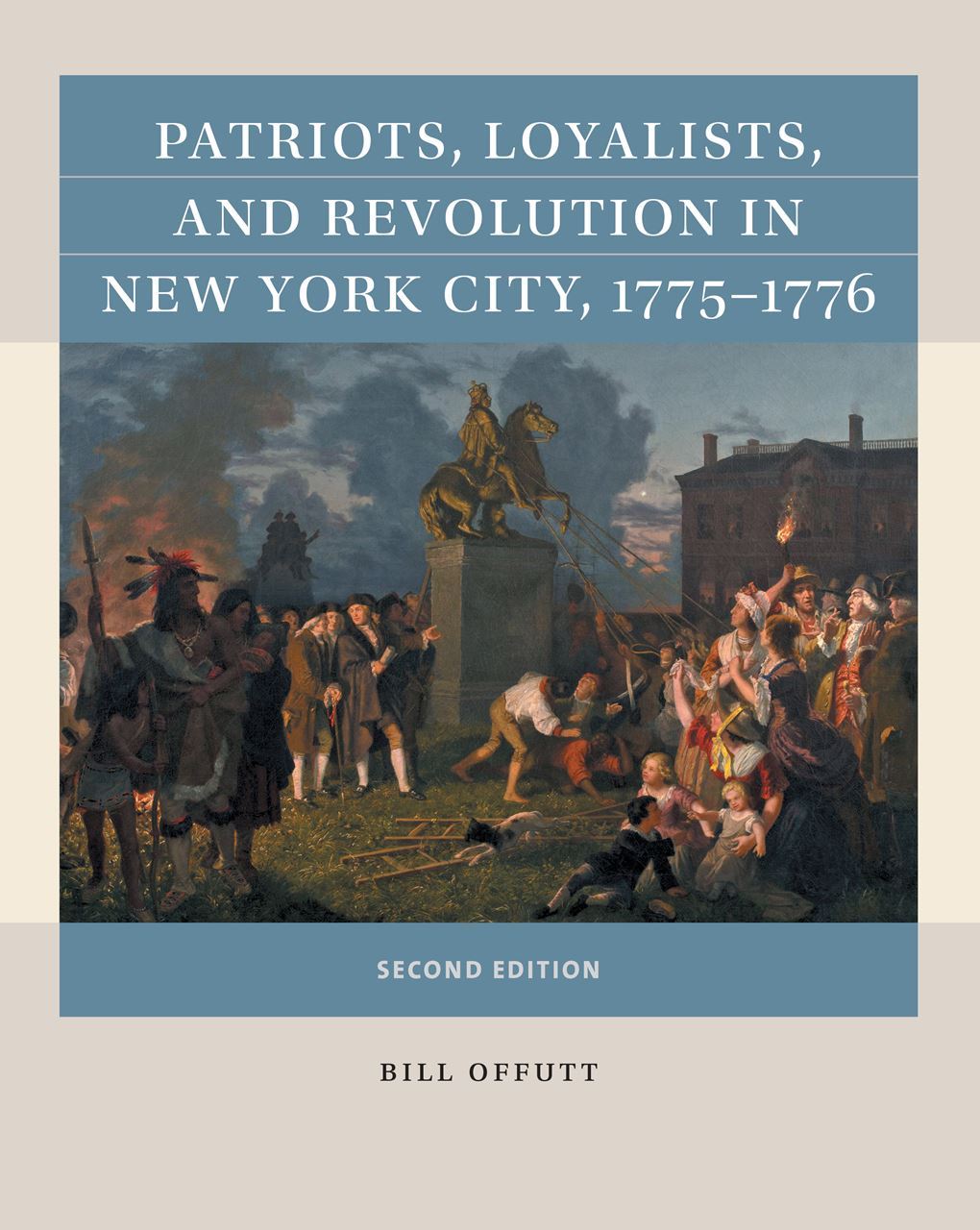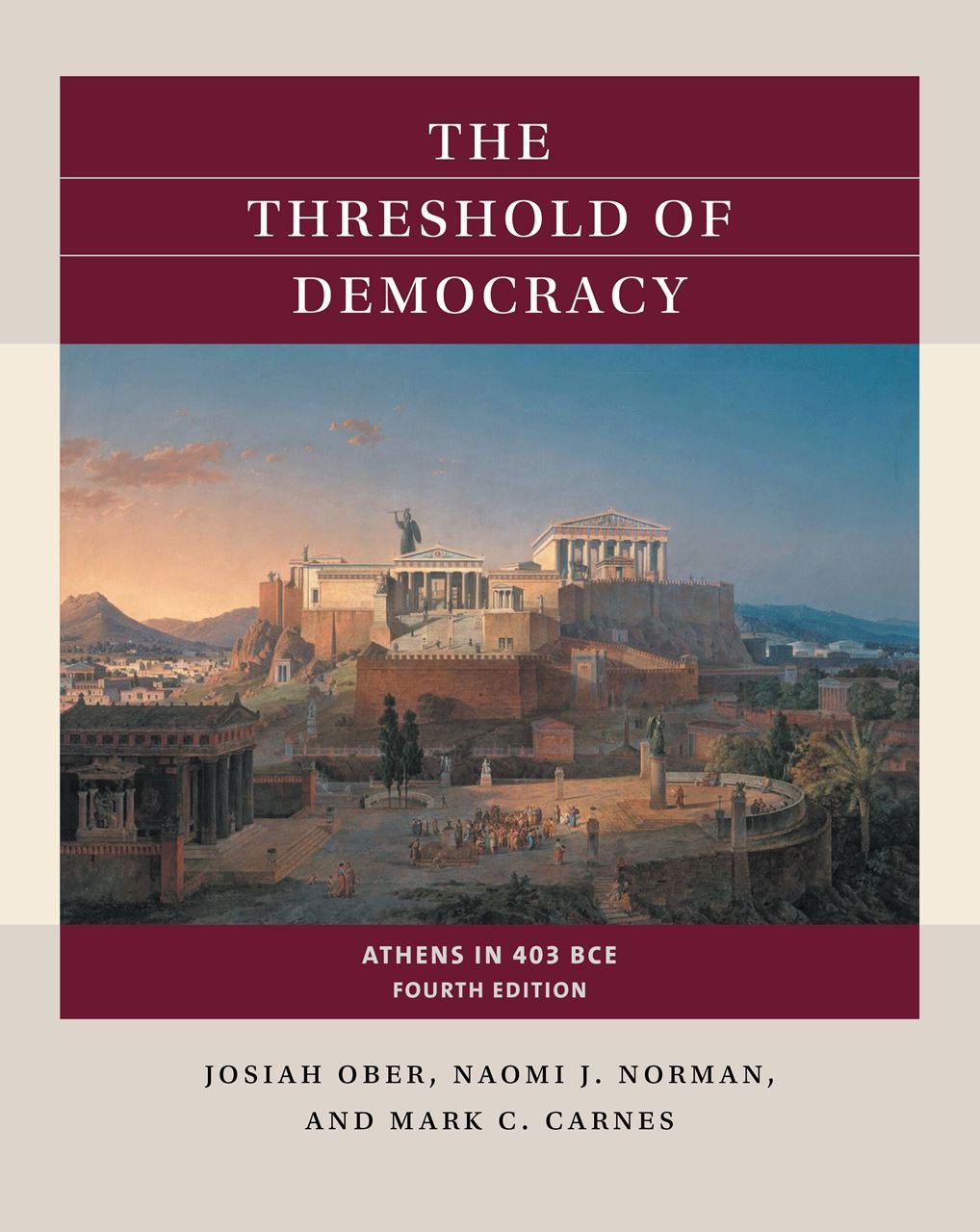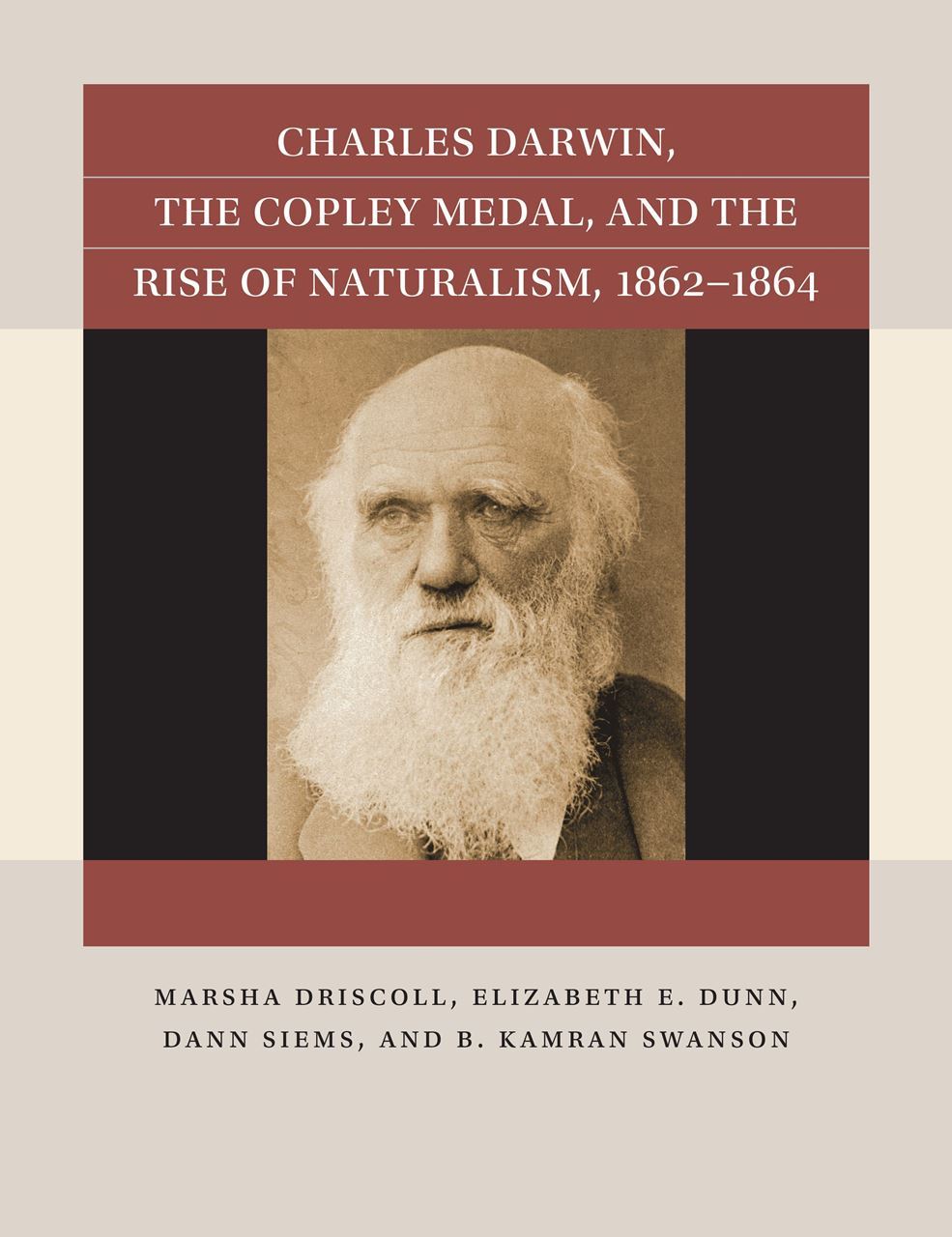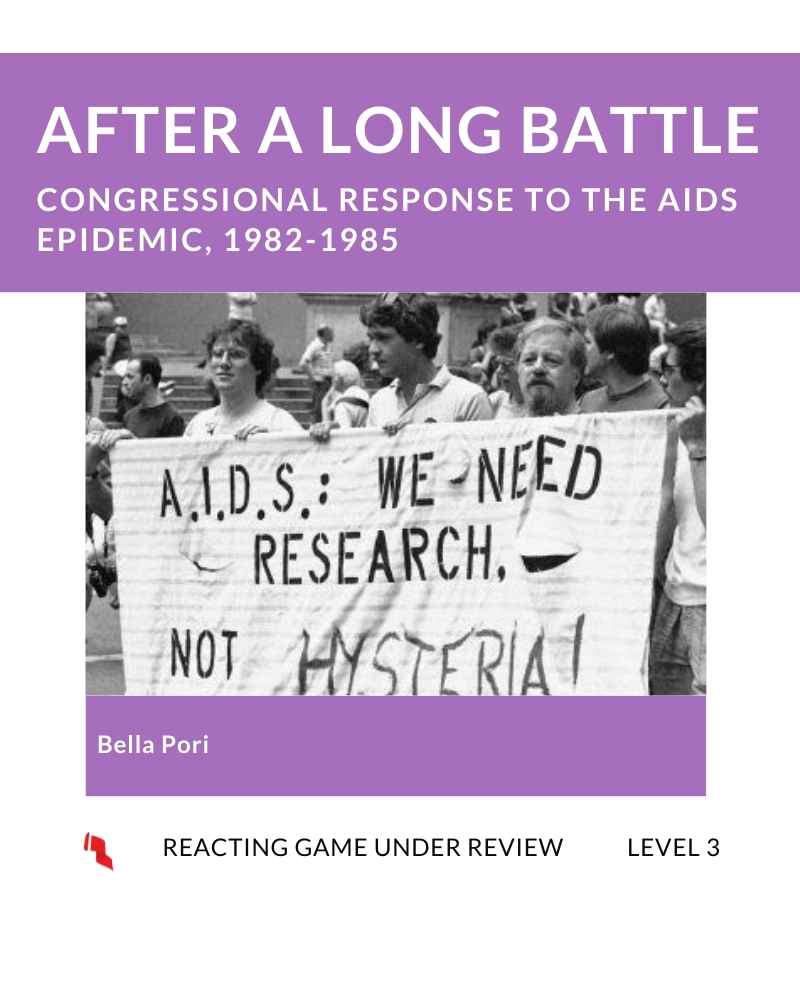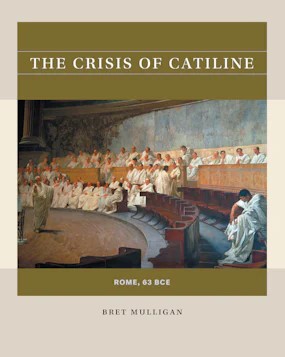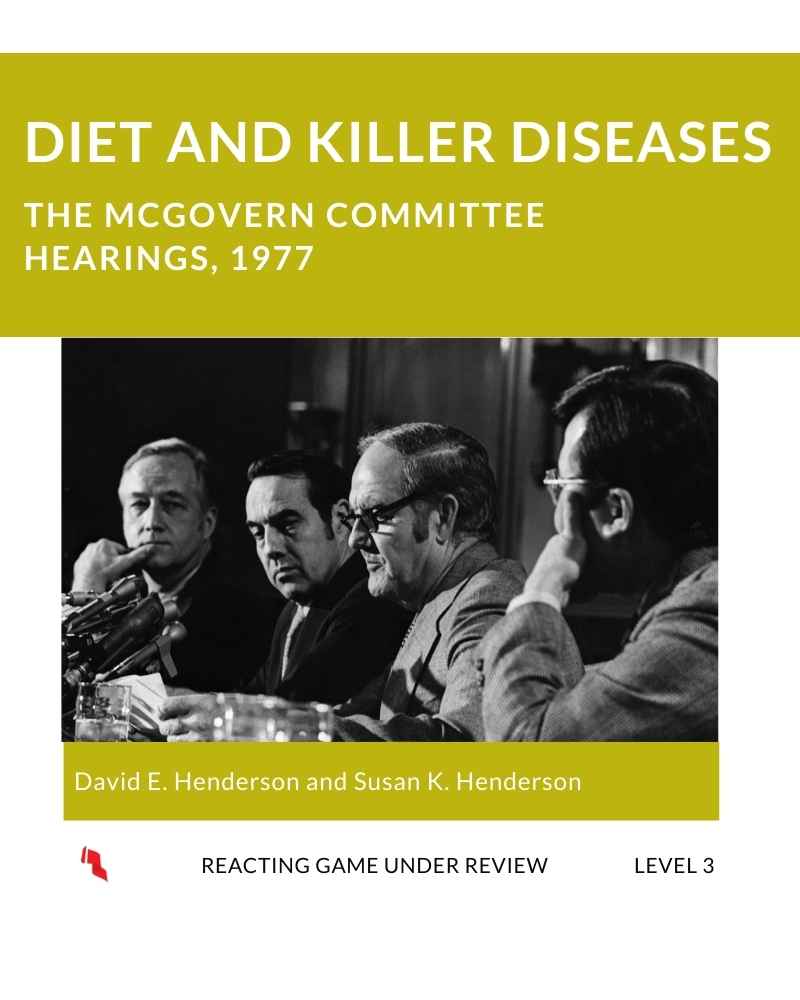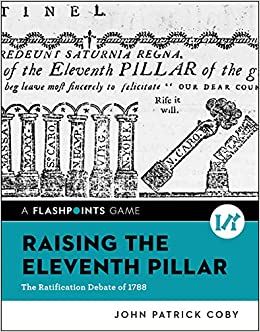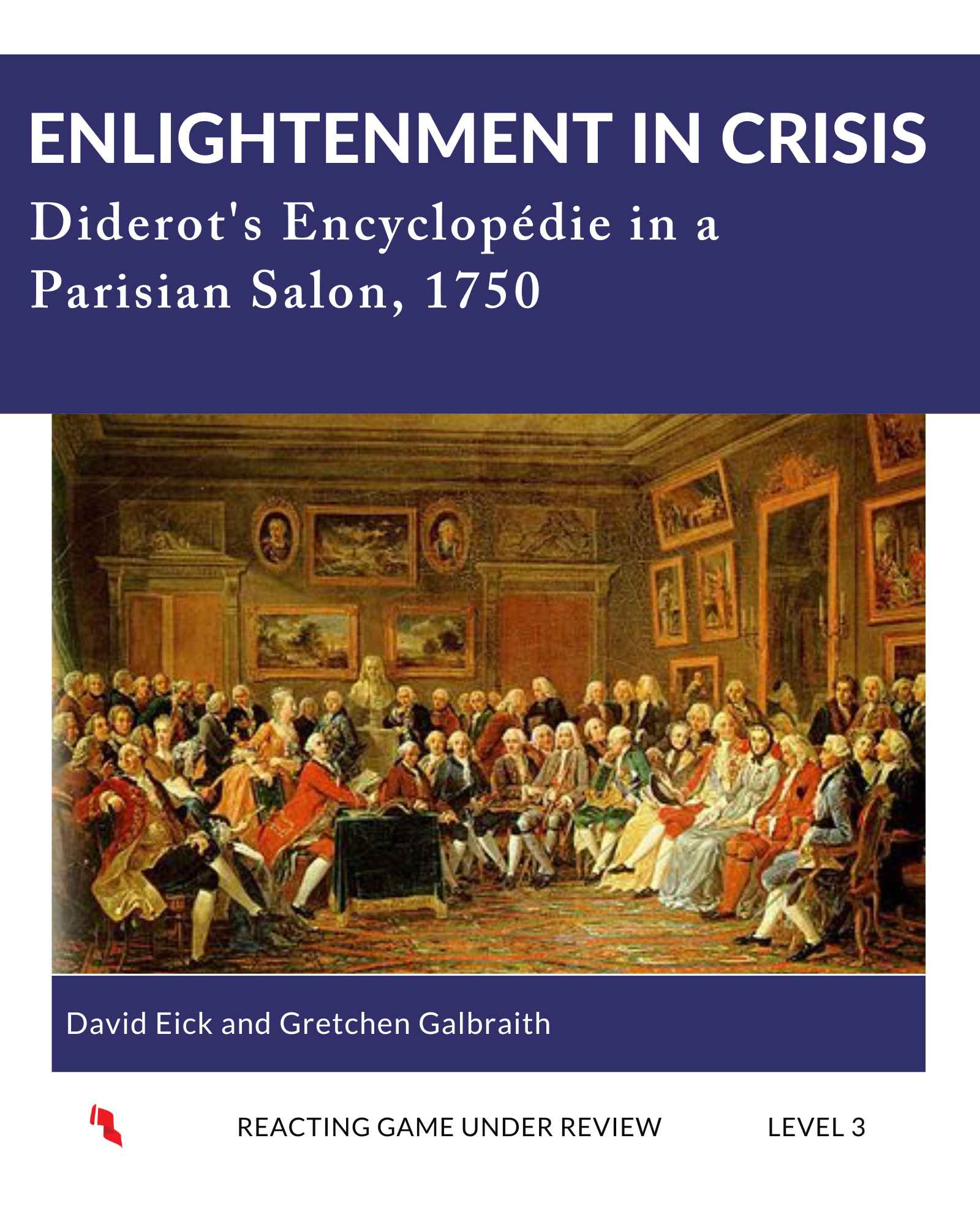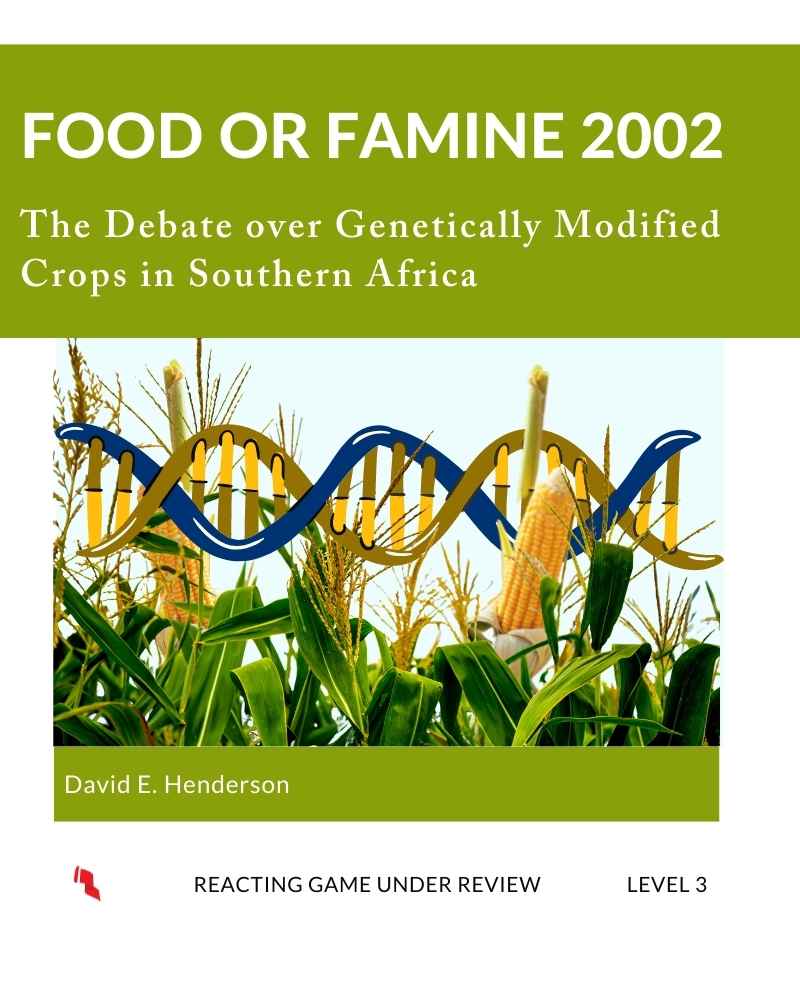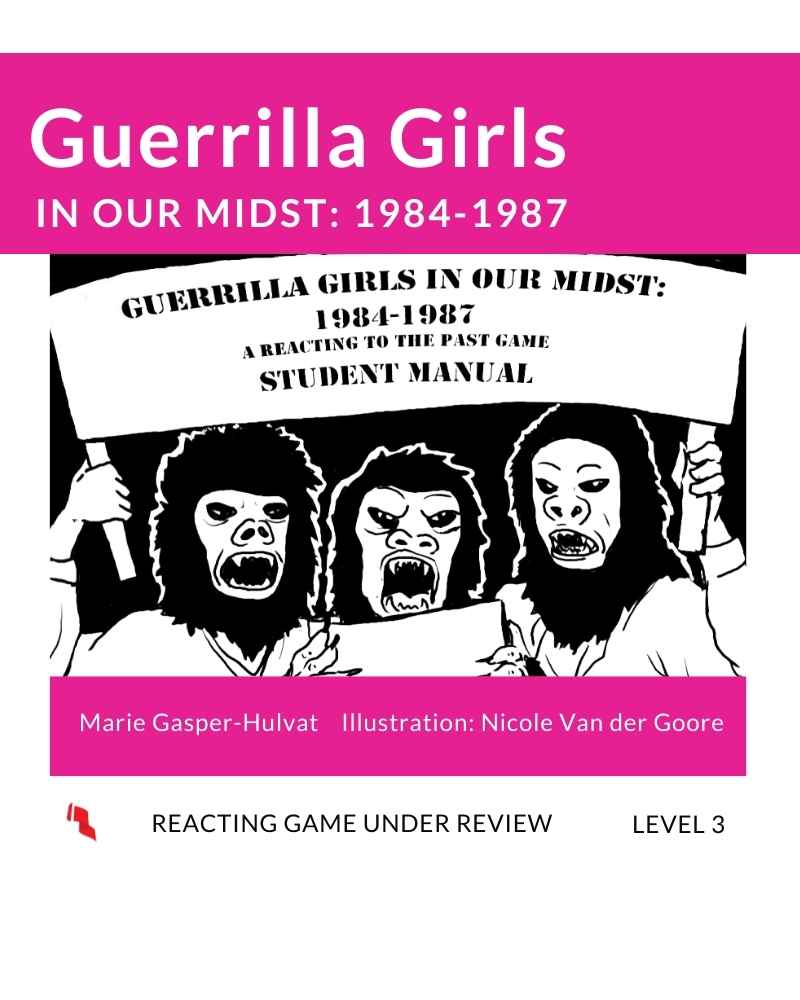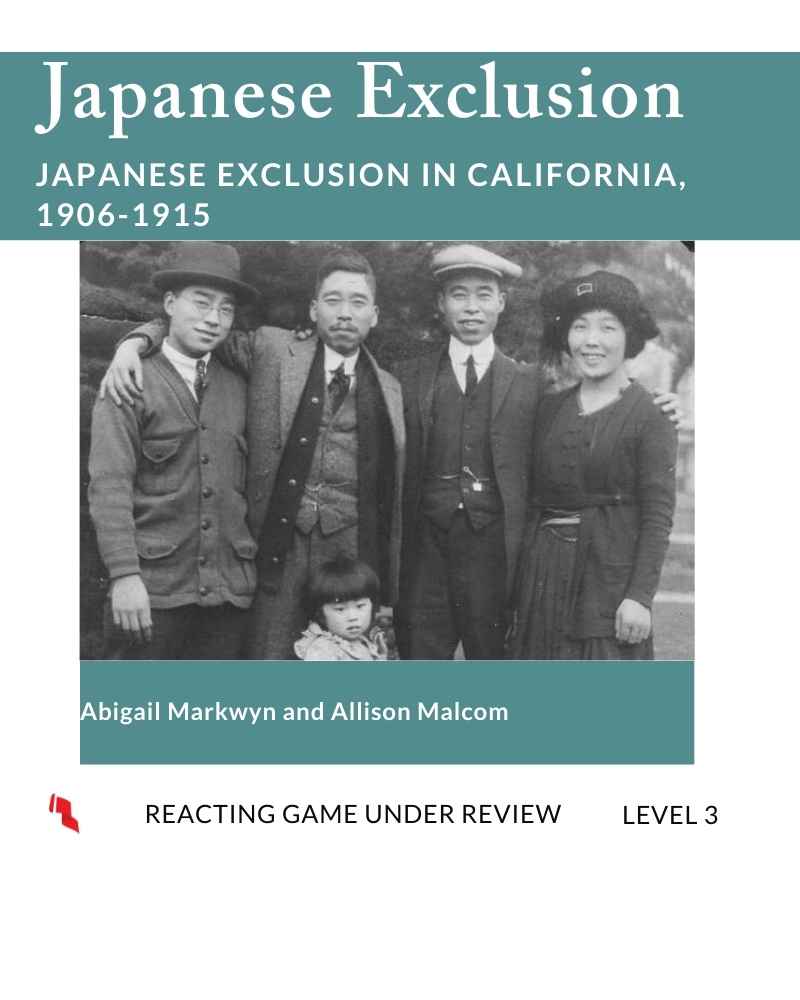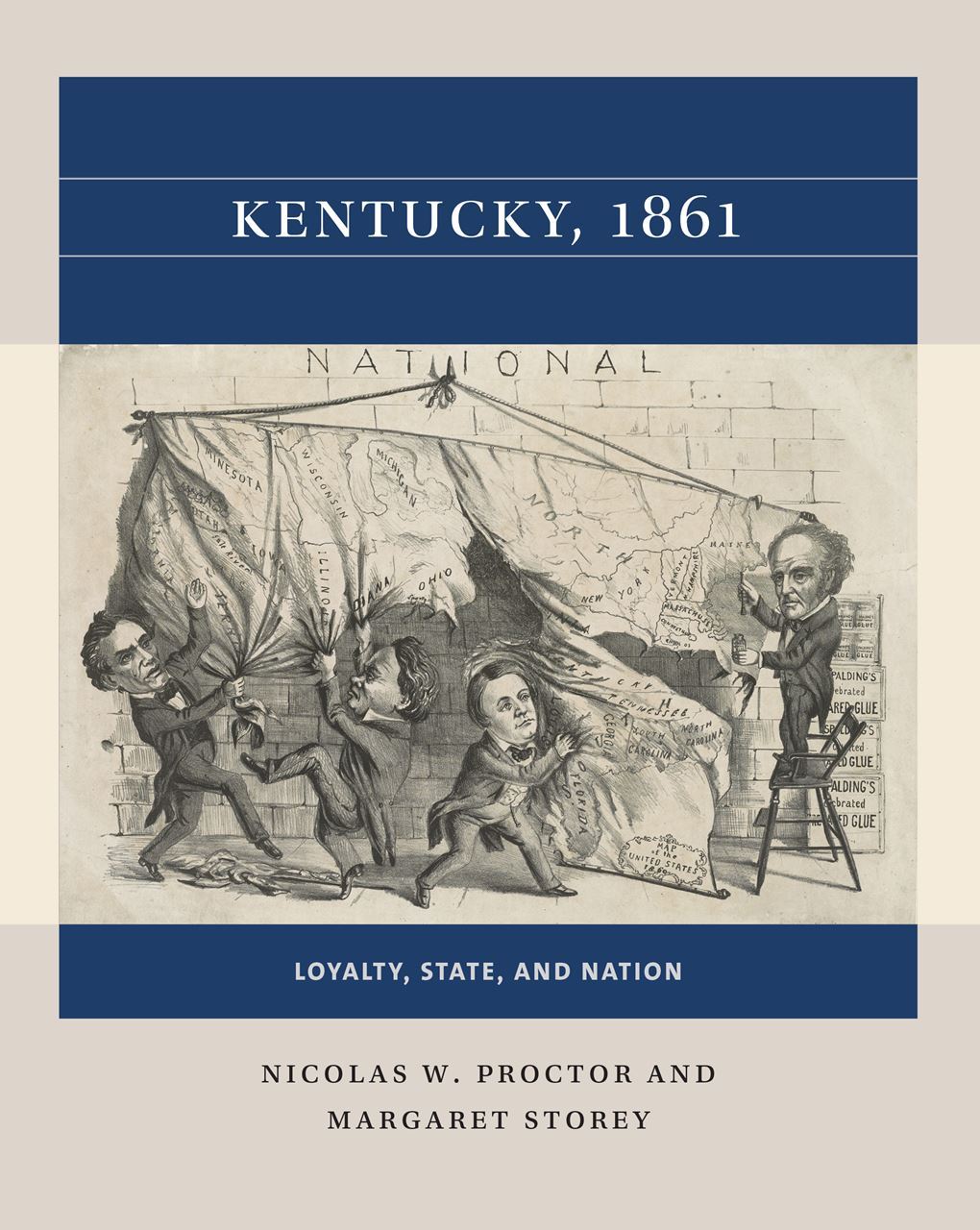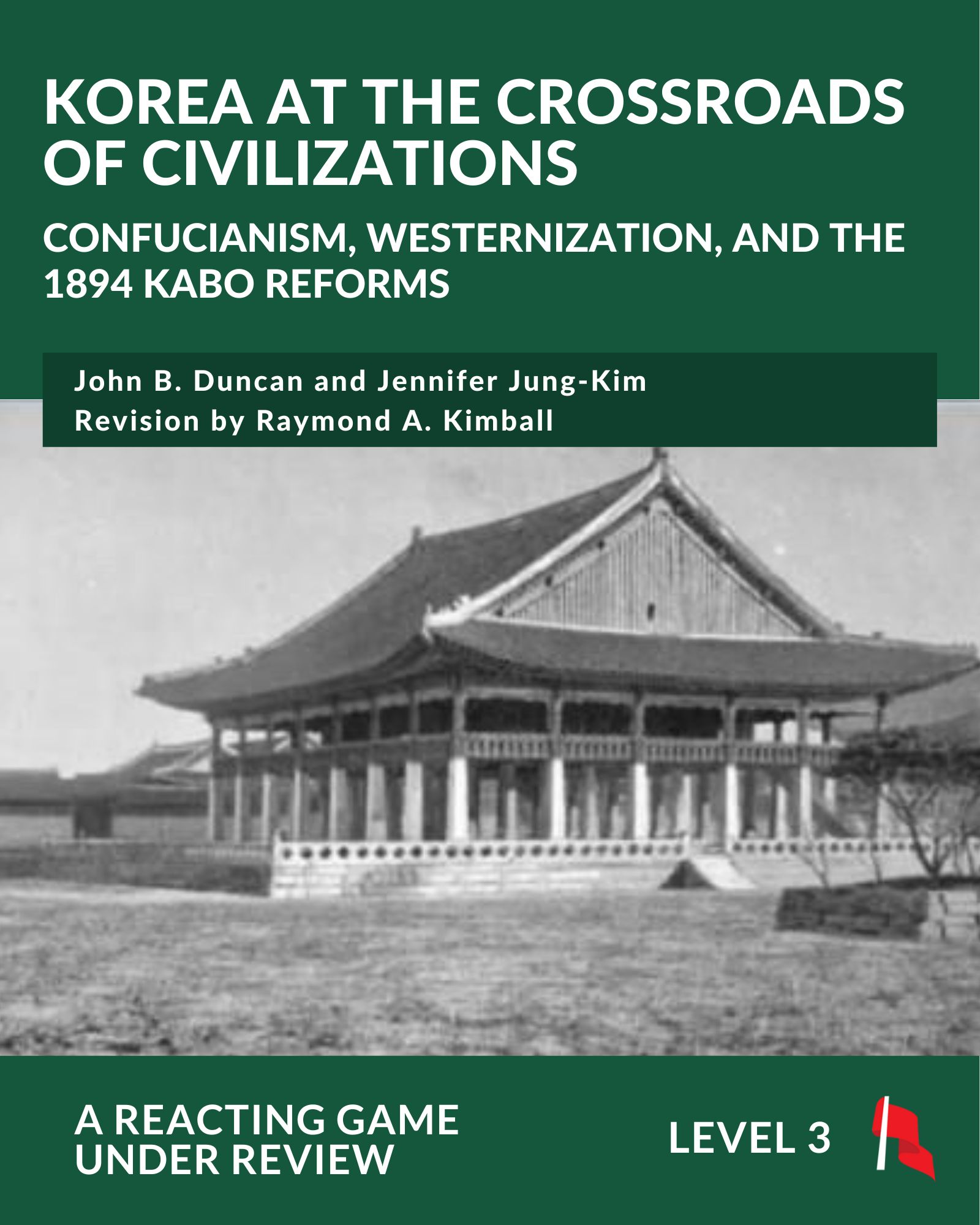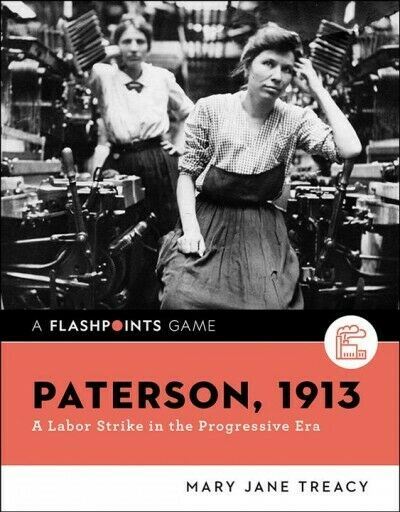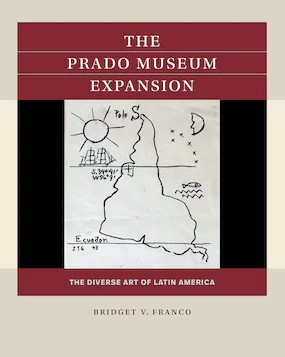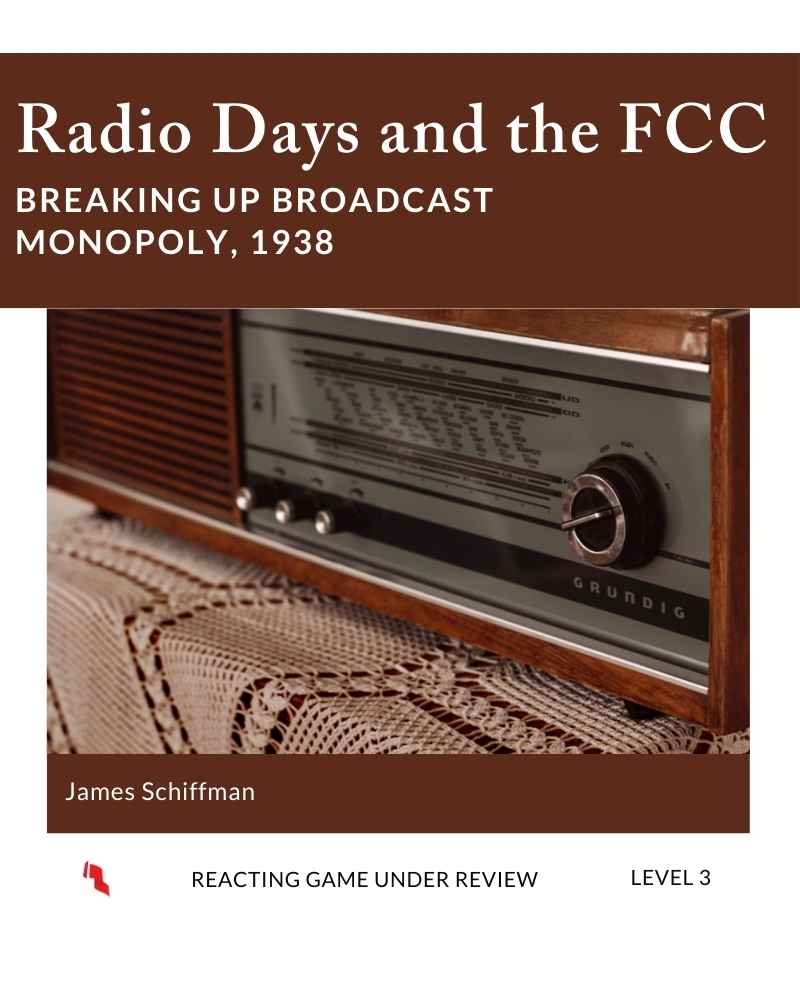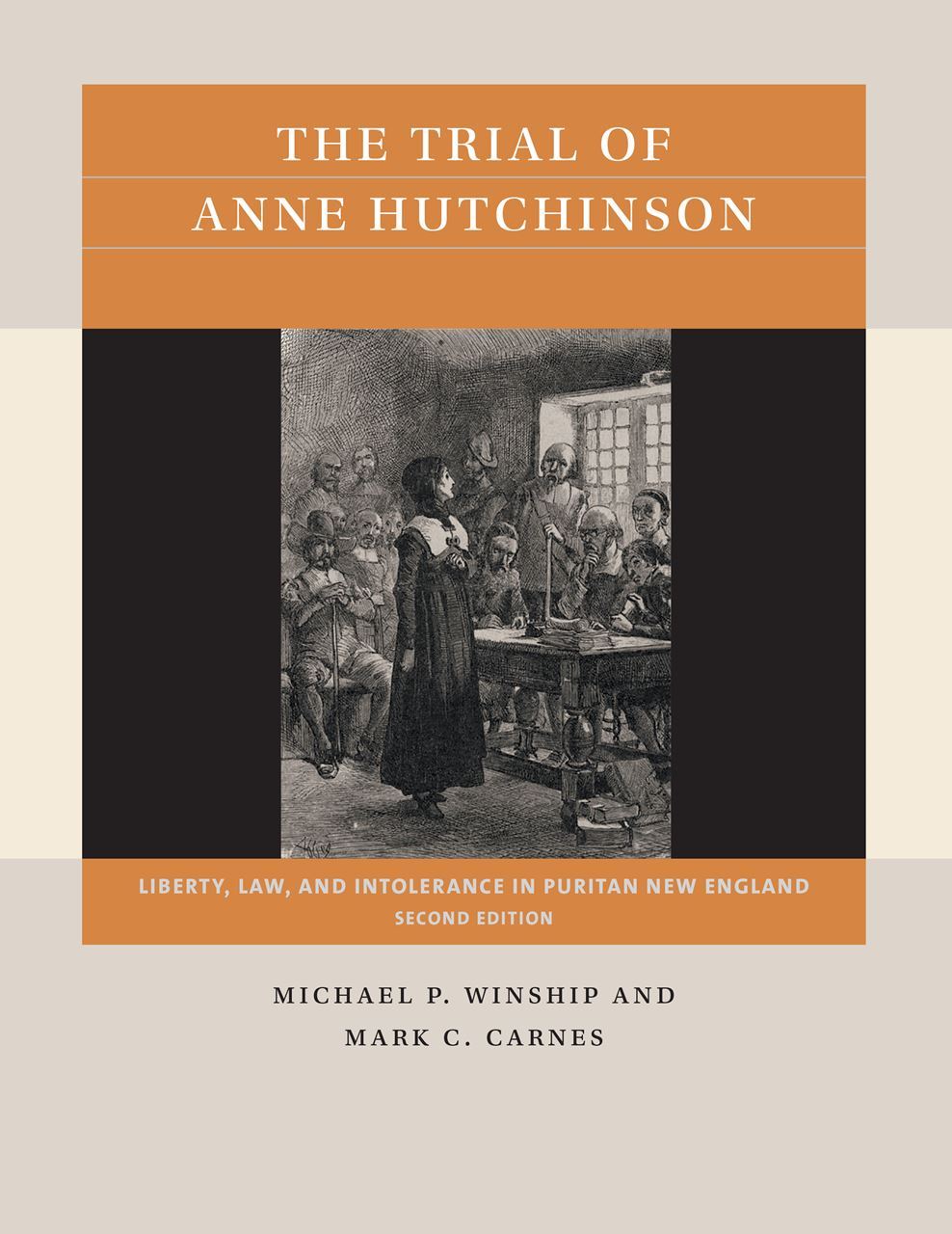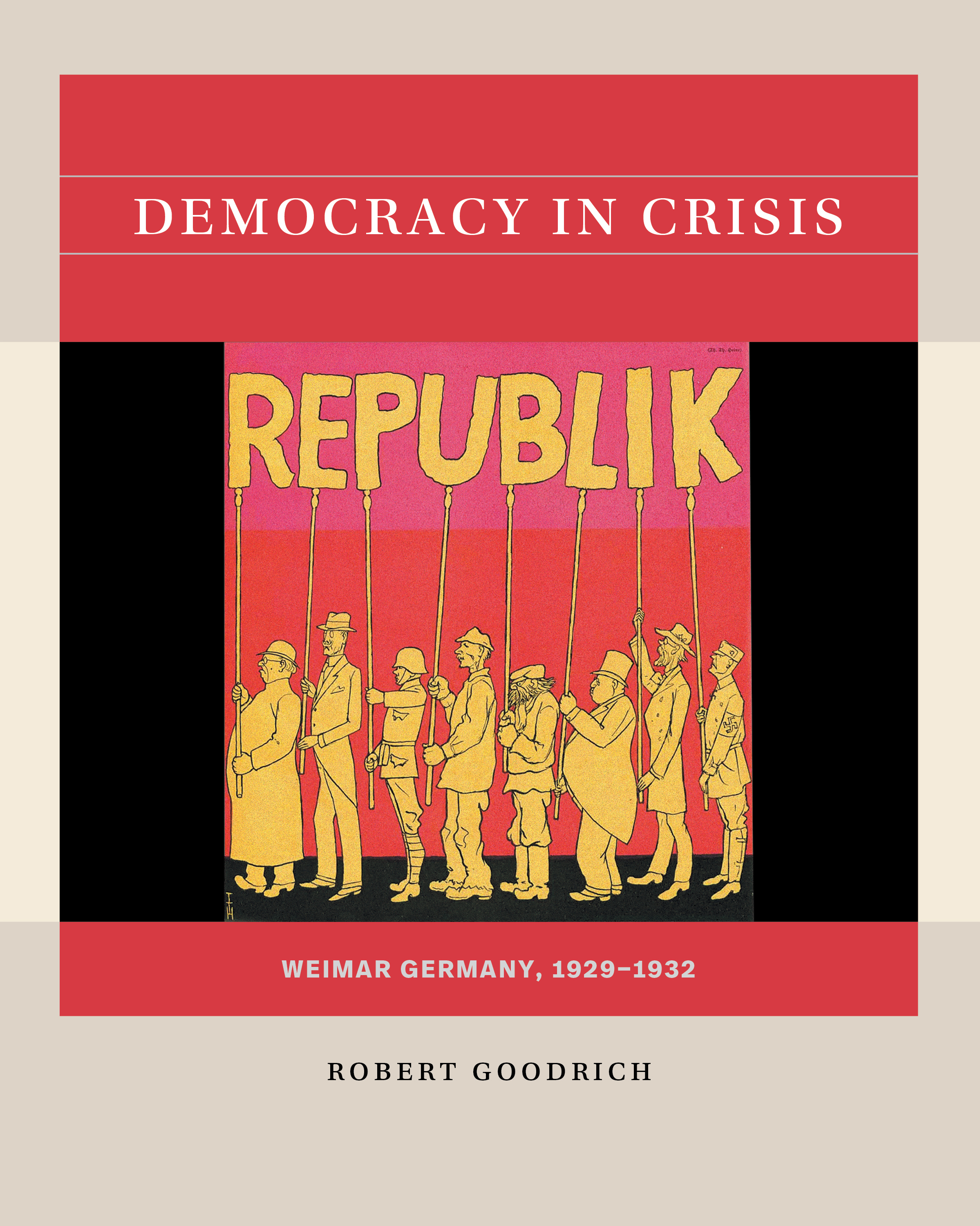Games FOR SMALL CLASSESBrowse and find Reacting games that are appropriate for classes with 11 students or fewer. |
Acid Rain in Europe, 1979-1989 Acid Rain in Europe covers the negotiation of the Long-Range Transport Pollution treaty. This was the first ever international pollution control treaty and remains at the forefront of addressing European pollution. 4-10 Sessions 11-40 Students 20th Century Europe Published Game (What's this Mean?) (STEM) |
Patriots, Loyalists, and Revolution in New York City, 1775-1776 Enter the political and social chaos of a revolutionary New York City, where patriot and loyalist forces argued and fought for advantage among a divided populace. Students engage with the ideological foundations of revolution and government to have their side in control of New York City at the end of 1776. 7-11 Sessions 11-29+ Students 18th Century North America Published Game (What's this Mean?) |
Modernism Vs. Traditionalism: Art in Paris, 1888-1889 Considers questions surrounding artistic developments at the end of the nineteenth century in Paris. Students will debate principles of artistic design in the context of the revolutionary changes that began shaking the French art world in 1888-1889. 6-7 Sessions 11-27+ Students 19th Century Europe Published Game (What's this Mean?) |
Ashoka: Becoming the Dharma King Ashoka returned from his successful war against Kalinga, grieved at the great suffering and loss of life he had brought to the land. He was determined to become a better Buddhist and a king who ruled not through force, but through the Dharma (literally “law,” but it comes to mean “true teaching” and “order of the universe”). As members of the Council, students represent the major traditions operative at Ashoka’s time: Brahmin Traditionalists, Jains, Ajivikas, and Buddhists who must advise the King on the policies that will help him become the Dharma-king. 7-9 Sessions 6-47 Students 3rd Century BCE Asia Level 3 Game (What's this Mean?) |
The Threshold of Democracy: Athens in 403 B.C.E. In the wake of Athenian military defeat and rebellion, advocates of democracy have reopened the Assembly; but stability remains elusive. As members of the Assembly, players must contend with divisive issues like citizenship, elections, remilitarization, and dissent. 7-15 Sessions 11-50 Students 5th Century BCE Europe Published Game (What's this Mean?) |
CHARLES DARWIN |
CHARLES DARWIN 2ND EDITION |
The Collapse of Apartheid and the Dawn of Democracy in South Africa, 1993 Post-Apartheid South Africa is facing tremendous social anxiety and violence. A Multiparty Negotiating Process has been called with the goal of reaching consensus for a new constitution. Race, cultural, economic, and political diversity create a complex landscape for students to navigate. 8-12 Sessions 11-27 Students 19th Century Africa Published Game (What's this Mean?) |
After a Long Battle: Congressional Response to the AIDS Epidemic, 1982-1985 Asks players to put themselves in the shoes of those living at the height of the AIDS epidemic in America when next to nothing was known about the virus. By taking the roles of congressional representatives, government epidemiologists, doctors, researchers, gay activists, preachers, journalists, and citizens, students can understand the radical changes to society when a new disease caught the country unprepared. 6-11 Sessions 10-30 Students 20th Century North America Level 3 Game (What's this Mean?) |
Constantine and the Council of Nicaea: Defining Orthodoxy and Heresy in Christianity, 325 C.E. Plunges students into the theological debates confronting early Christian church leaders. Emperor Constantine has sanctioned Christianity as a legitimate religion within the Roman Empire but discovers that Christians do not agree on fundamental aspects of their beliefs. 7-10 Sessions 7-40+ Students 4th Century SW Asia, Europe Published Game (What's this Mean?) |
Constantine and the Council of Nicaea: Defining Orthodoxy and Heresy in Christianity, 325 C.E. Second Edition Students immerse themselves in the theological debates that defined the challenges and disagreements within the church leadership, addressing fundamental aspects of Christian beliefs. Can the bishops assembled at the council resolve these issues, or will the church face division or dissolution? The outcome of this conference holds the power to shape the trajectory of Christianity for centuries to come. 7-10 Sessions 7-40+ Students 4th Century SW Asia, Europe Published Game (What's this Mean?) |
The Crisis of Catiline: Rome, 63 BCE Rome, 63 BCE: a tumultuous year of urban and rural unrest, economic instability, sensational trials, and electoral misconduct. Rumors that Lucius Sergius Catiline is plotting to violently seize control have created a frenzy. You are a Roman senator. Can you save the Republic…and yourself? 2-8 Sessions 8-41 Students 1st Century BCE Europe Published Game (What's this Mean?) |
Diet and Killer Diseases: The McGovern Committee Hearings, 1977 Many trace the origin of the low-fat diet craze to the Senate hearings of the McGovern Committee in 1977. This game examines the scientific evidence available in 1977 by expanding the hearings to include a larger range of voices than were invited to the actual hearing. Students will take the role of senators and the media while examining scientific evidence at the time linking dietary fat to health. 3-8 Sessions 6-36 Students 20th Century North America Level 3 Game (What's this Mean?) (STEM) |
Raising the Eleventh Pilar: The Ratification Debate of 1788 Students sit as delegates to the New York State Ratifying Convention. Eight states have ratified to date, but a ninth is needed to give effect to the Constitution. The central issue of the game is democratic representation and the debate between the federalists and Antifederalists. 3 Sessions 7-100+ Students 18th Century North America Flashpoints (What's this Mean?) |
"Engines of Mischief": Technology, Rebellion, and the Industrial Revolution in England, 1817-1818 Players are faced with different choices about how to live and prosper at the dawn of the Industrial Revolution. Do you resist or embrace this new technology? Players must use new economic theories, parliamentary commissions, and news reports to debate the pros and cons of factories, the role of the government in the economy, taxation, workers’ unions, and the extension of political rights down the social order. 5-13 Sessions 10-28 Students 20th Century North America Published Game (What's this Mean? |
The Enlightenment in Crisis: Diderot's Encyclopedié in a Parisian Salon, 1750-? The story of the Encyclopédie is one of epic struggle, with colorful characters both famous and obscure. Participants will have to immerse themselves in salon culture, figure out who potential allies are, do written and oral work toward victory objectives, and build toward making ultimate decisions about their relationship to the Enlightenment as a whole and the Encyclopédie in particular. 8-11 Sessions 11-33 Students 18th Century Europe Level 3 Game (What's this Mean?) |
Food Fight: Challenging the USDA Food Pyramid, 1991 Set during a 1991 Congressional hearing that evaluated the USDA’s development of the Food Pyramid, a document that angered various agribusiness groups and some nutrition experts. This Open Access Reacting Game can be used in food and nutrition general education science courses and introductory chemistry and biology courses. 3-5 Sessions 11-35 Students 20th Century North America Published Game (What's this Mean?) |
Food or Famine, 2002: The Debate over Genetically Modified Crops in Southern Africa Set in an African conference at which nations facing famine are confronted with the choice between accepting genetically modified (GM) corn from the USA and the risk that they will not be able to export their agricultural products to the EU as a result or allowing people to starve. Students learn about GM foods and the controversies over their safety, both for health reasons and ecological reasons. 4-5 Sessions 6-29 Students 21st Century Africa, International Level 3 Game (What's this Mean?) (STEM) |
Rousseau, Burke, and Revolution in France, 1791 Plunges students into the intellectual and political currents that surged through revolutionary Paris in the summer of 1791. Members of the National Assembly gather to craft a constitution for a new France while wrestling with the threat of foreign invasion, power struggles, liberty, and citizenship. 8-14 Sessions 12-41 Students 18th Century Europe Published Game (What's this Mean?) |
Guerrilla Girls in our Midst: 1984-1987 The booming 1980s New York City art scene saw the emergence of a feminist art collective known as the Guerrilla Girls who exposed contemporary art world sexism and racism. Major questions for debate range from whether the art world is sexist and should embrace affirmative action to whether artistic quality even matters, who gets to determine such quality, and whether one can legitimately tie quality to sincerity of expression within a postmodern world. 8-9 Sessions 10-34+ Students 20th Century North America Level 3 Game (What's this Mean?) |
Japanese Exclusion in California, 1906-1915 In the wake of the 1906 earthquake, a progressively-minded San Francisco School Board votes to remove Japanese schoolchildren from their regular schools in order to send them to the segregated “Oriental School” in Chinatown. This event occurs against a backdrop of violent attacks on Japanese people in California. 6-12 Sessions 10-42 Students 20th Century North America Level 3 Game (What's this Mean?) |
Kentucky, 1861: Loyalty, State, and Nation Pulls students into the secession crisis following Lincoln's 1860 election. During a special session of the Kentucky legislature, set against the looming threat of violence, students grapple with questions about the future of slavery and the constitutionality of secession. 6-10 Sessions 11-28+ Students 19th Century North America Published Game (What's this Mean?) |
Korea at the Crossroads of Civilizations: Confucianism, Westernization, and the 1894 Kabo Reforms Reform has swept through East Asia following the irruption of Western imperialism in the second half of the nineteenth century. Set in the Deliberative Council, a body established by the Korean court in the midst of the Sino-Japanese War to discuss and implement measures to restructure government, economy, society, and education. 6-16 Sessions 10-26 Students 19th Century Asia Level 4 Game (What's this Mean?) |
Paterson, 1913: A Labor Strike in the Progressive Era New technologies are changing the nation's silk industry, workers are losing ground, labor organizations are offering solutions from reformist to radical. A city's economy hangs in the balance: what will happen? Can you save Paterson and its people? 3-5 Sessions 11-35 Students 20th Century North America Flashpoints (What's this Mean?) |
The Prado Museum's Expansion: The Diverse Art of Latin America With an eye to diversifying its predominantly national Spanish-centered collection, the Prado Museum decides to curate a new gallery of Latin American paintings from the 20th and early 21st century. Artists and art dealers from Argentina, Brazil, Chile, Colombia, Costa Rica, Cuba, Ecuador, Mexico, Peru, Puerto Rico, and Uruguay have arrived in Madrid to advocate for their paintings' stylistic and historical importance. 8-9 Sessions 10-28 Students 21st Century Latin and South America Published Game (What's this Mean?) |
Radical Reconstruction in New Orleans, 1868-1876 At the end of the Civil War, the Thirteenth Amendment ended slavery, but this was not the end of conflict. As the largest city in the South, New Orleans was home to thousands of recently-enslaved Freedpeople as well as French-speaking Black Creoles, white unionists, German immigrants, and Yankee carpetbaggers. This game examines the ways in which these groups interacted with one another and contended with the myriad challenges of the Reconstruction era. 6-7 Sessions 11-30 Students 19th Century North America Level 3 Game (What's this Mean?) |
Radio Days and the FCC: Breaking up Broadcast Monopoly The Federal Communications Commission is holding hearings on what to do about the perceived monopoly power that the major radio networks – NBC and CBS – exercise over their affiliated stations. Game sessions involve witnesses taking testimony on a series of six questions before the Commission and culminates in a final, decisive vote that will decide the future of the radio industry. 5-13 Sessions 10-28 Students 20th Century North America Level 3 Game (What's this Mean?) |
Changing the Game: Title IX, Gender, and College Athletics A debate over the role of athletics quickly expands to encompass demands that women’s sports and athletes receive more resources and opportunities. The result is a firestorm of controversy on and off campus. Students wrestle with questions of gender parity and the place of athletics in higher education. 7-10 Sessions 10-40+ Students 20th Century North America Published Game (What's this Mean?) |
The Trial of Anne Hutchinson: Liberty, Law, and Intolerance in Puritan New England Recreates one of the most tumultuous and significant episodes in early American history: the struggle between the followers and allies of John Winthrop, Governor of the Massachusetts Bay Colony, and those of Anne Hutchinson, a strong-willed and brilliant religious dissenter. 7-9 Sessions 11-19 Students 17th Century North America Published Game (What's this Mean?) |
Peacemaking, 1919: The Peace Conference at Versailles Places students in the complicated and politically fraught peace conference that will bring an end to the Great War. Students represent nations as they seek to bring about peace not only for the present, but also the future. For this game, students work primarily in topical subcommittees charged with recommending course of action to the Council of Five. The result will be a treaty by many hands, many visions, and many competing interests. 7-9 Sessions 10-28 Students 20th Century Europe, International Level 3 Game (What's this Mean?) |
Monuments and Memory-Making: The Debate over the Vietnam Veterans Memorial, 1981-1982 When the Vietnam War drew to a close, the process of memorializing the conflict resulted in a tug-of-war over the national narrative of the 20+ year struggle. Students will take part in the conversations and controversies that emerged as the nation grappled with how best to memorialize what was at the time the longest conflict in US history. 8-9 Sessions 10-35 Students 20th Century North America Published Game (What's this Mean?) |
Democracy in Crisis, Weimar Germany, 1929-1932 Liberalism, nationalism, conservatism, social democracy, Christian democracy, communism, fascism, and every variant of these movements contend for power in Germany. As delegates of the Reichstag, players must contend with street fights, trade union strikes, assassinations, and insurrections, along with intense parliamentary wrangling. 8-12 Sessions 8-60+ Students 20th Century Europe Published Game (What's this Mean?) |


